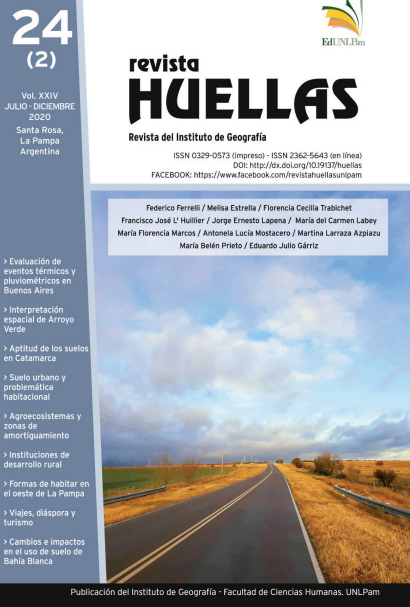Cambios e impactos en el uso de suelo en una ciudad intermedia. El caso de la Avenida Alem. Bahía Blanca, Argentina
Palabras clave:
Cambios urbanos, Usos del suelo, Impactos, Nuevas centralidades, Bahía BlancaResumen
El trabajo se centra sobre un tramo del eje Avenida Alem de la ciudad de Bahía Blanca, un centro urbano intermedio, donde se producen modificaciones de importancia por las intervenciones de distintos agentes intervinientes. En el trabajo se constatan cambios a nivel morfológico, funcional, estructural y simbólico, que modifican la materialidad del sector. Además se incluye la visión patrimonial por su importancia en preservar la identidad del eje y lo normativo que limita intervenciones y conflictos. También se analizaron investigaciones anteriores del sector Alem, pero presentaban metodologías dispares; por ello, se efectuó un nuevo relevamiento cuya unidad de análisis es la parcela y su actividad, muchas de ellas nuevas e inexistentes en la normativa actual para el sector. Se complementó con revisión de materiales en archivos, mapotecas, catastro, diarios y revistas de época. Se procesó la información con SIGArc Sig10 y QGis 2.18, además de elaborar cartografía temática. El resultado, más interesante, resultó la importancia y magnitud del uso residencial, por efecto de la densificación.Descargas
Citas
- Borja, J. (2003). La ciudad Conquistada. Madrid: Alianza Editorial S.A.
- Borja, J. (2011). Luces y sombras del urbanismo en Barcelona. Buenos Aires. Café de las Ciudades.
- Carter, H. (1984). El estudio de la Geografía Urbana. Madrid: Instituto de Estudios de Administración Local.
- Circa (1920). Álbum Argentino, EdBahía Blanca: Bahía Blanca.
- Diez, F. (1997). Buenos Aires y algunas constantes en las transformaciones urbanas. Buenos Aires: Fundación Editorial de Belgrano.
- Estebanez, A. (1988). Los espacios urbanos. En Puyol, Estébanez y Méndez, Geografía Humana. Madrid: Cátedra.
- Formiga, N. y Marenco, S. (Coord.) (2000). La dinámica urbana. El proceso de desarrollo vertical y la problemática de la marginalidad urbana en Bahía Blanca. Bahía Blanca: EdiUns.
- Gárriz, E. Prieto, M. B. y Formiga N. (2005). “Efectos dinamizadores y articulaciones en la configuración territorial”, en X Encuentro de Geógrafos de América Latina (EGAL), “Por una Geografía latinoamericana. Del laberinto de la sociedad al espacio de la solidaridad”, San Pablo- Brasil, Publicado en CD, Pp 5961-5981.
- Gazzolo, B. (2012). Tesis de Licenciatura en Geografía “Cambios en el uso del suelo en un eje simbólico bahiense: la Avenida Alem¨, Bahía Blanca, Departamento de Geografía y Turismo, UNS, Inédito.
- Gray de Cerdan, N. (1977). Territorio y Urbanismo. Bases de Geografía Prospectiva. Mendoza, Universidad Nacional de Cuyo.
- Gray de Cerdan, N. y otros. (1983).Los modelos de uso del suelo en la zona pericentral mendocina", Boletín de Estudios Geográficos, Vol.XXI, N 81, Mendoza, Instituto de Geografía.
- Lefbvre, H. (1974). La producción del espacio urbano. París, Éditions Anthropos.
- Lois González, R. (Coord) (2012). Los Espacios urbanos. El estudio geográfico de la ciudad y la urbanización, Madrid: Grupo Editorial Siglo XXI.
- López Ospina D. (2017). Regulación del uso del suelo: implicaciones frente al precio del suelo en Bogotá, Maestría en Administración Pública. Buenos Aires: Universidad de Buenos Aires Facultad de Ciencias Económicas Escuela de Estudios de Posgrado.
- Municipalidad de Bahía Blanca (1991). Código de Zonificación. Bahía Blanca, MBB.
- Municipalidad de Bahía Blanca (1996). Código de Planeamiento Urbano Bahía Blanca. Bahía Blanca, MBB.
- Municipalidad de Bahía Blanca (1999). Ordenanza N° 10.672 Área especial Alem. Bahía Blanca, Honorable Consejo Deliberante.
- Pinassi, A. (2017). Patrimonio cultural, turismo y recreación. El espacio vivido de los bahienses desde una perspectiva geográfica. Bahía Blanca, EdiUns.
- Pradilla Cobos, E. (1997). Regiones o territorios, totalidad y fragmentación: reflexiones críticas sobre el estado de la teoría regional y urbana. Revista Eure. Pp.68, 45-55.
- Santos, M. (1990). Por una geografía nueva. Madrid: Espasa-Calpe.
- Zarate Martin, A. (1991). El espacio interior de la ciudad. Madrid: Editorial Síntesis.






.png)













3.jpg)
4.png)


